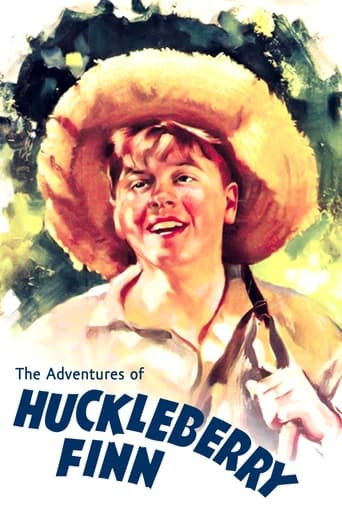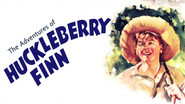MartinHafer
Back in the 1930s and 40s, Hollywood often took a rather cavalier attitude towards classic material. A great example is 1936's "Romeo & Juliet", which featured actors two to three times the age of the characters and credits 'additional dialog' to an MGM writer! Another is "Wuthering Heights"...where the studio tacked on a HAPPY ending!! Because of this, I assumed that they'd similarly ruin Mark Twain's classic story of Huck Finn...especially because the story has a strong abolitionist slant...and studios OFTEN would sanitize these sorts of things in order to not offend racist audience members! I was shocked, then, when the story turned out to be very close to the source material...and as a result, it is a fine movie. It also deeply humanizes Jim and makes for an amazingly heartfelt film. Well worth seeing.By the way, at one point in the film, Huck is bitten by a rattlesnake and Jim cuts open the wound and sucks out the poison. Despite this being a common belief, this is NOT a good idea!! Kids, don't try this at home.
Fisher L. Forrest
Most novels are long enough to require considerable editing to make them fit into the usual 90 minute format that Hollywood preferred in the days of 1939. What to leave out is always a problem. Someone's favourite scene is sure to be lost, whatever the treatment writers do. Mark Twain' classic seems to have always been troublesome for Hollywood. Put in too much and someone is sure to scream "racist"; Leave out too much and someone else is going to scream "chicken"! This version strikes a rather nice balance, but of course it didn't please everyone. Personally, I feel that leaving out Tom Sawyer is all to the good. His antics always seemed farcical to me. The comedy that remains in this version is not exaggerated, but is rather subtle. The real defect is that the film proceeds smoothly for about the first two-thirds, up to the time Huck is bitten by the snake. After that, everything is rushed and choppily edited. It makes for a disappointing finish. I admit, though, that the lynch mob scene, with Jim cowering in the jail as the mob batters down the jail door is exciting. If you are unfamiliar with both novel and film, I'll let you find out how Huck saves Jim! This cast does an excellent job of presenting Mark Twain's characters. After all, MGM had probably the best stable of character actors in 1939 of all the studios. Rex Ingram stands out as "Jim", but Mickey Rooney truly was born to play "Huck". Charges that the subtle changes to Mark Twain's original, so far as the slave Jim and the attitudes toward him are portrayed, mark this film as "racist" strike me as absurd. Efforts to bar the film, sometimes even the novel, here and there, are just Political Correctness run amok. Slavery was part of American Life in the time frame of the story, and attitudes varied from region to region. This is accurately reflected in both film and novel. Jim, too, get s sympathetic treatment in both. Where's the "racism"?
Fred
I've added a little to my review, which was originally posted on May 4th, 2006. Thank you to the 4 out of 6 people who said they found my original review helpful. You'll see my additions starting about a third of the way down: I re-read Mark Twain's novel this week, and borrowed this movie version yesterday from my public library. I have just watched it and have to say that it is one of the most thorough distortions of HUCKLEBERRY FINN ever filmed. The novel is unambiguously anti-slavery. When you read the book you are supposed to be horrified that Huck doesn't actually realize he's doing the morally right thing by helping Jim escape slavery. The movie constantly emphasizes that Huck is right to be ashamed that he's helping Jim. M-G-M was so afraid of offending the bigoted part of its audience that it turned Twain's irony upside-down. The studio dispensed with Twain's dialogue in all but the most fleeting moments and substituted tepid bits of business. Key revelations are placed way too early. There is a courtroom scene in the movie while in the book there is not even a trial. None of this was done to make it a better movie. All of it was done to make everything safe for M-G-M. Mickey Rooney as Huck and Walter Connolly as the Dauphin give stand-out performances, but the dialogue, which surely isn't Twain's for more than a millisecond, serves them poorly. Rex Ingram's performance as Jim would have been inspiring if Twain's words were left intact. Instead he's reduced to interpreting lines from a melodrama having absolutely nothing to do with the towering work of literature this movie pretends to have as its source. Finally, M-G-M is not entirely to blame for this awful distortion. The blame rests on America's profound history of racism; a history Mark Twain wanted us to confront; a history deliberately, decidedly ignored in this outrageous revision of his art. HERE'S the racism of this movie: While, near the end of the novel, Jim is put in chains because of the simple fact that he is a runaway slave, the movie justifies Jim's imprisonment by having the mob think Jim has murdered Huck. Any mob would be somewhat justified in capturing and jailing a man who is thought to have murdered a child. But in the book, the people who put Jim in chains think he is a different runaway slave. They put him in chains simply because he's been turned in for a reward. The people who have turned him in (the Duke and the Dauphin) have never known that Jim has been accused of murder. This is because the Duke and the Dauphin don't know where Huck and Jim come from. The Duke and the Dauphin want money, so they print up a false ad with a description of Jim and plaster it on billboards saying he's a runaway slave. The Duke and the Dauphin are not even certain he actually is a runaway slave. Jim is put in chains by people who have never heard that he's suspected of murder. Hollywood, afraid to remind people of what their ancestors actually did, makes the lynch mob rather sympathetic. HERE'S a distortion of Twain's book. Early in the book, Jim and Huck discover a shack which has been destroyed in a flood. There's a dead man in there. Both Jim and Huck know the body is someone who's been shot. But only Jim sees the face. He tells Huck not to look. This body is not mentioned again until the second-to-last paragraph of the entire novel, when Jim, who has just learned that he's been freed in his late owner Miss Watson's will, tells Huck that the dead man in the shack was his father. The movie, however, has Jim confess to Huck, about two scenes after the scene in which they find the body, that he didn't tell Huck at first because he didn't want Huck to stop helping him run away. Huck then gets angry at Jim and calls him a false friend for not telling him. In the novel, Jim does not say why he didn't tell Huck at first and he certainly offers no apology, as he does in the movie. Huck does not call Jim a false friend in the novel. What happens in the final paragraph (which comes just after Huck learns that the dead man was his father) is that Huck tells us that he's going to head West to avoid Aunt Sally's plan to adopt him. We are not told if he's mad at Jim for taking him down the river without telling him his father's dead. Because we know Huck had been running away from his abusive father and yet still loved him, we can assume his world was shattered when he learned his father was dead. So, what does Depression-era Hollywood do with a story which ends with its main character determined to get away from everybody he's ever known? It has him, in the last scene in the movie, promising Aunt Sally he'll be good. He's so good, in fact, that he's just persuaded her, one scene earlier, to believe him when he tells her that slavery is wrong (which he never says in the book)and that Jim should be freed. She agrees to free him, in this movie, if Huck promises to do his schoolwork and not smoke and always to wear his shoes. He promises to do all that. The scene ends cutely with Huck secretly slipping his shoes off. This is not merely a cute ending. This is an ending designed to counter Twain's other point, which is that society is deeply corrupt and forces creatures of nature, such as Huck, to live in a state of perpetual flight.
raskimono
I am surprised that there is no other review for this movie and I am the first to post my opinion on this box office hit of 1939, a top 20 hit of its year. When I sat down to watch this adaptation of the famous Mark Twain novel, I knew the running time was under 90 minutes so I did not expect to get the full book which I have read but the cliff notes version which I have also read. But no, Louis B. Mayer just had to give it the MGM cornball effect with scenes which are not in the novel and which change the meaning and transformation of Huck's character. Mickey Rooney, the biggest child actor the movies have ever heard, and in my opinion, also the best it has had brings one of those flawless performances to the role. Rex Ingram makes for a good runaway slave Jim and the other performances are fine. Direction is pendant in the hands MGM journeyman - that is not a craftsman, not an auteur, imagination insignificant, camera angles; perfunctory, directing actors; left to your own devices - Richard Thorpe who had a long and healthy career in Hollywood. You wonder why? The first half does feel like a cliff notes version as the scenes skip through have a general lethargic pace but keeps your attention because the story is good anyway. The changes involve the capture of Jim and Huck's injury and the resolution of the aforementioned events. It is not what happens and tongue-in-cheek ending changes the message of Twain's classic. I won't say I didn't enjoy it. I just mean if you are going to alter a classic, you'd better come up with something better.




